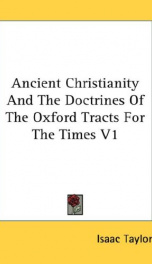ancient christianity and the doctrines of the oxford tracts

Purchase of this book includes free trial access to www.million-books.com where you can read more than a million books for free. This is an OCR edition with typos. Excerpt from book: THE THIRD AND FOURTH PROPOSITIONS, AND CONCLUDING REMARKS. We have next to look at thequod ubique, and the quod ab omnibus, in relation to our present subject; that is to show, that this principle, and these practices, belonged to, and were thoroughly approved of by, the ancient church, throughout its whole extent, so far as our historical materials enable us to ascertain the fact; and were explicitly maintained and promoted by All the great leaders of the religious commonwealth; and were exeepted against by only here and there a solitary voice, which was almost instantly stifled by orthodox zeaL However warmly the ulterior inferences I have in view may be resented by some, I am sure they are not the persons who will come forward to call iu question the facts which I here assume. On this ground, therefore, the actual citation of proofs might be waived. Bui, in truth, as the establishment and illustration of my fifth thesis, and which it is of the utmost importance to make good, will demand a reference, more or less copious, to the extant works of almost every ecclesiastical writer of the first seven centuries, these numerous citations will, of course, embrace whatever would have offered itself as proper for establishing the third and fourth propositions. We may, therefore, save ourselves the labour of going through a mass of duplicate evidences; and I therefore, in this place, and once for all, request you to bear in mind that, if either of these propositions were disputed, an ample confirmation of them is to be found in the sdries of quotations which are to sustain the fifth.For the present, then, I assume it as incontrovertible, whatever consequences it may be found to involve, that the doctrine and custom of religious celibacy was an article of ancient Christianity, acc...
Info about the book
Author:
Series:
Unknown
ASIN:
B0030GG4XI
Rating:
2.5/5 (2)Your rating:
0/5
Languge:
English
Users who have this book
Users who want this book
What readers are saying
What do you think? Write your own comment on this book!
write a commentif you like ancient christianity and the doctrines of the oxford tracts try:
Other books by this author
Do you want to read a book that interests you? It’s EASY!
Create an account and send a request for reading to other users on the Webpage of the book!


